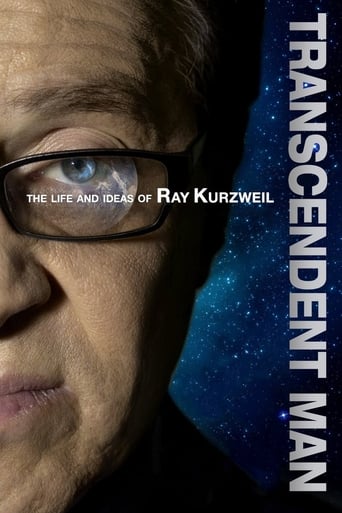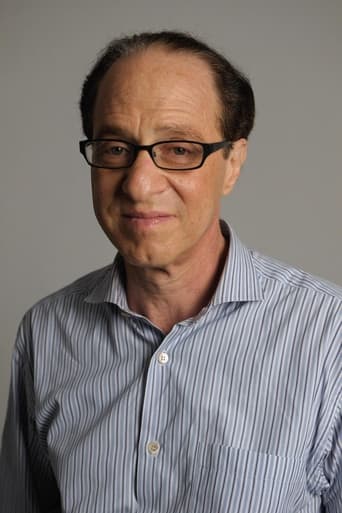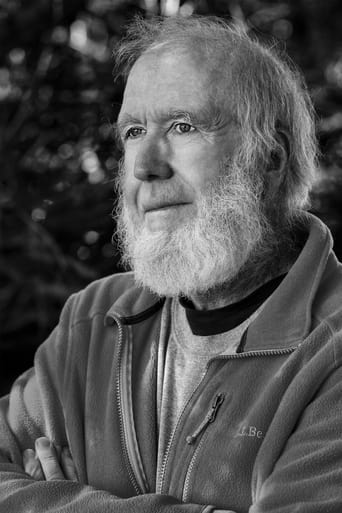

Transcendent Man (2009)
The compelling feature-length documentary film, by director Barry Ptolemy, chronicles the life and controversial ideas of luminary Ray Kurzweil. For more than three decades, inventor, futures, and New York Times best-selling author Ray Kurzweil has been one of the most respected and provocative advocates of the role of technology in our future.
Watch Trailer
Cast


Reviews
The future isn't talked about enough. We need to be able to predict where we are going as a society so we can be ready for what's going to happen. Ray Kurzweil is a futurist. He spends all day every day thinking about the future. He is a genius inventor and he even invents things that we don't have the technology to make yet. If there's someone who can predict the future of technology, this is the guy. If you read his book, The Singularity is Near, you know exactly what "The Singularity" is and what is means for the human race. To put it in one sentence, it's the point where technology advances so exponentially fast that we can't even comprehend the growth. Ray explains that technology is advancing exponentially, and in a few decades, it will be advancing too fast for our own brains to comprehend. In order to keep up, we must merge with machines to enhance our intelligence and become immortal, super-intelligent, god-like cyborgs that will mostly spend time in full submersion virtual reality doing whatever our imaginations can imagine. The book explains everything that this documentary doesn't and if this doc interests you then I highly recommend the read. It's really hopeful stuff and people need to realize how important technology is going to become. We use our cellphones so much that they become a part of us. Sooner or later they will be a part of us. This is a very good summary to a very interesting subject. If you're very religious you may not like it due to its atheist theme, but people with an open mind will be very intrigued.
The documentary is, to an extent, a film version of Ray Kurzweil's nonfiction text, *The Singularity Is Near: When Humans Transcend Biology* (2006).If you're not familiar with Ray Kurzweil's ideas, then I recommend familiarizing yourself with them. I want to go so far as to say he comes closest to articulating the general "mythology" of our time in regards to our relationship with technology.This was a wonderful documentary to watch before reading his book. It's also interesting because the ambivalent nature of our relationship to technology comes through in an intense way. Indeed, the extremes of "technology-as-savior" and "technology-as-doom" are evident in this documentary. For example, Ray Kurzweil believes that, eventually, machine intelligence and human intelligence will merge together, and that the next stage of human evolution involves our connection to technology: this connection will result in immortality. And yet, other scientists believe that machine intelligence will stay separate from us and, surpassing us in capabilities, intelligence, vision, will come to see us as a mere "insects." Thus, they'll destroy us with as much prejudice as we destroy a nest of wasps or some irritating rabbits.We have here the vision of either technology as Utopia or technology as Dsytopia: the U.S.S. Enterprise or Skynet.A lot of the documentary foregrounds Kurzweil's views, but I wouldn't go as far as to say it's biased towards them. A lot of time is spent allowing his detractors to speak. Particularly, Hugo De Garis becomes the representative of the "dark side" of Kurzweil's technological vision. De Garis spends a lot of time talking about the "artilect war," a scenario he has imagined. The artiloect war, according to De Garis, will take place right before machines achieve consciousness. The war will be fought between people who think that intelligent machines should be built and people who believe intelligent machines are our doom and should not be built. We basically have, in De Garis's scenario, a fight between the two visions: those who recoil from technology as the death of humanity and those who embrace technology as the full manifestation of humanity (i.e. our destiny).There are other vexed issues in terms of our relationship to technology that come through in this documentary, namely, how we are coming to interface with it. One question is, where do the boundaries of the human end? After we have replaced our eyes, our lungs, our brains, our limbs with technological apparatuses, when do we stop being human and start being machines? This is a metaphysical question regarding the fundamental ontological nature of human being as an discrete experience.A lot of folks are reluctant to watch this documentary because they feel like Kurzweil is "just wrong." I think that's the wrong way of going about it. It doesn't really matter if he's right or wrong. What matters is that such visions are even being expostulated. That a man has written books claiming that technology will save us; that others have written books saying that technology will destroy us: these developments are culturally significant.They point toward our vexed relationship with technology, the degree to which we both love it. And hate it.
Kurweil and many others have been chattering about their "Singularity" since at least the mid- 1990s. This is not the astronomical phenomenon, but is similarly dense. Basically, the notion that machines, specifically computers, will someday soon exceed the intelligence, cognitive, perceptual, analytical, and other mental powers of humans, and become "self-aware" and achieve consciousness. As seen in the Terminator movies, The Matrix, this has become one of the basic, stock tropes of science fiction, though it has been around in fundamentally the same form as present since the early 1980's, at least. Interesting stuff, and not only for entertainment purposes. And clearly machines will (and have already) become more able than humans at a wide range of tasks. From Big Blue beating Gary Kasparov at chess more than a dozen years ago, to welding robots in auto plants, machines do many things faster, and ultimately better than man. Persons under 20 have much less "data" in their heads, having come to rely so heavily on Wikipedia and Google (having been taught to do so by parents and teachers, in fact), and the online fact is up-to- the-minute and dead-accurate, isn't it? More reliable than what lies in your mind? No doubt computers will continue to increase in power, and in the influence they have on our lives. And we will come to rely even more on them than we do now.However, Kurweil, like almost all the other exponents of the Singularity, including those offering a much darker version of the future than Kurweil's, fails to understand and take account of a number of critical points. First, the notion of consciousness/awareness, and even of intelligence itself is poorly defined. Neurologists, brain scientists, psychologists, who study the human mind as a profession disagree fundamentally as to what these qualities even are, how they work, or why one individual human has them in abundance, another hardly at all. The human mind and brain may truly be the last frontier of science. We know less, understand less, about the brain and mind than we did of infectious disease in the early 19th century, and psychologists and brain scientists would agree. We are only making a bare beginning at understanding the brain and nervous system, and how it works, and how we actually use it.For Kurweil, or anyone else, to predict machines of any sort will attain human levels of consciousness, intelligence, or thought by 2040, or even by 2080 (two frequently cited dates) is a patent absurdity which takes no account of the state of neuro-science and psychology. Who will design or program this machine that emulates, then exceeds, the human brain/mind? In order to make a copy, you have to understand the original in every nuance. Not the kludgy, narrow silliness of "Eliza" or "Racter", but something that can reliably pass a Turing test and also learn. And as for self-awareness, that would be a trick, wouldn't it? You'd need some sort of reverse Turing test to apply to the machine. That's Kurweil's problem, and that of his colleagues. They are, none of them, professionals in medicine, psychology, brain science, or neurology, nor do any of them (that I am aware of) have ANY training in these disciplines. And until brain science advances a GREAT deal, I fear there is little hope of a machine that even approaches human consciousness, nor general ability and ADAPTABILITY and the ability to LEARN. For focused, targeted tasks there are super-human machines, and will be more and better every year. Futurists would do well to understand the question before giving out answers, especially extraordinary 'predictions.' There are computer scientists working with research physicians and brain scientists, each learning the others fields (a very healthy activity for progress into such a brave new world), and the most optimistic among them might predict a computer that you can actually have a real, spoken conversation with (on LIMITED subject matter) in another 20 years. As for a whole mind, anything coming anywhere NEAR to the overall human capacity for language, learning, problem solving, changing one's self to suit the environment (and the environment to suit one's self), and both analytical/logical thought as well as creative/lateral/syncretic thought, that will have to wait until we first understand what it is. Oh, of course. I forgot. What about the machine that improves and modifies itself when the lights are turned off? It'd first have to have a motive or some sort of imperative to do that, and more importantly, some model of what it was modifying itself INTO, and would have to understand that model at its essence, which is the whole problem and main barrier to the human endeavor towards this end. It's a catch-22: you need consciousness and human intelligence to build it, and to WANT to build it. So sorry Ray, it ain't gonna happen in your lifetime (and you should look elsewhere for the talents and ideas that will eventually get us there. They aren't to be found is CSE programs or Silicon Valley)."Transcendent Man" was a fun docu to watch. Kurweil is an articulate spokesman for his ideas, and a likable fellow. This is a thoughtful, well-made non-fiction film, and should spark a great deal of thought in those interested in the subject.
The subject of this documentary, Ray Kurzweil, is an accomplished inventor and futurist whose creations include a reading machine for the blind. The film focuses on Kurzweil's ideas about "The Singularity" an event in which humans will be able to incorporate machines into their bodies, including their brains, and augment their intelligence. Kurzweil sees a great deal of promise in this, including the potential for immortality.The film provides an interesting portrait of the man and his ideas, but it suffers from a relative lack of questioning of his optimism. Kurzweil has an at times deterministic vision of technological progress that fails to account for human foibles, and the double-edged sword of technology itself.For example,Kurzweil dismisses the issue of class totally as it applies to who can benefit from technological advancement. Kurzweil argues that the costs of new technology are only prohibitive during its early stages. He points to the fact that his reading machines for the blind have become more affordable. This ignores the fact that even in a wealthy society like the United States, many people cannot afford even basics like health care. The benefits of Kurzweil's techno-utopia are likely to fall on the wealthy alone.Furthermore, the law of accelerating returns that Kurzweil relies on seems deterministic, and ignores variables such as declining natural resources. At times, his faith in technological progress has an almost religious quality, particularly given the fact that he places so much hope on technology for achieving immortality.



